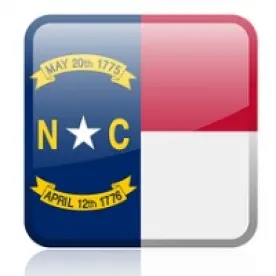MEDICAID EXPANSION BILL SENT TO GOVERNOR
House Bill 76, a bill to expand Medicaid in North Carolina, received final approval from the North Carolina House of Representatives on Thursday. The bipartisan vote in the House was 87-24 in favor of sending the measure to Governor Roy Cooper, who is anticipated to quickly sign it into law. The vote on Thursday came 13 years to the day of the passage of The Affordable Care Act which overhauled U.S. healthcare laws, including a state-by-state option to expand Medicaid.
Implementation is conditional on the state passing a new budget, a clause Republican leaders inserted to give them more influence with Cooper and other Democrats who might have to tolerate additional GOP policies and spending priorities to obtain expansion — a longtime top Democratic priority.
As the 40th state to adopt the expansion, North Carolina would see an increase of hundreds of thousands of residents on its Medicaid insurance rolls, the majority of whom are likely working adults who cannot afford health insurance. The majority of these expenses would be covered by the federal government, which would invest countless sums of money in the healthcare sector.
However, in the end, The Save Act was eliminated from the bill. The act would have permitted advanced practice registered nurses, who are all required to hold a master's degree or higher and a state certification, to care for patients without a doctor's oversight. Even though doctors charge tens of thousands of dollars a year to sign paperwork, nurses claim that this supervision frequently amounts to nothing more than that. Doctors' associations have opposed the idea in the name of patient safety. The act was rejected as a result of House leadership's support for doctors.
MEDICAL FREEDOM ACT PROGRESSES
House Bill 98 advanced Tuesday in the state House and would prohibit public schools, colleges, and universities in North Carolina from demanding a student to provide proof that they have received a COVID-19 vaccination. The proposal, supported by Republican sponsors to safeguard individual freedom of choice, would also prohibit state agencies, cities, and counties from refusing to hire anyone who declines to receive the COVID-19 vaccination or fails to provide documentation that they have already received it. Mandate adoption is still an option for private businesses. Additionally, the bill would outlaw the requirement of booster shots at public universities. According to NCDHHS data, of all North Carolina residents who have received the initial COVID-19 vaccine, 59% have received at least one booster shot and 22% have received the updated Omicron variant booster. After some Democrats questioned its necessity given the prevalence of religious and medical exemptions, the proposal was approved by the House Health Committee on Tuesday. Before being put to a vote by the entire House, the bill must pass two additional committees.
MEDICAL DEBT LEGISLATION INTRODUCED
According to state Treasurer Dale Folwell, eastern North Carolina has some of the highest rates of medical debt that is being collected nationwide. According to Folwell, the “Medical Debt De-Weaponization Act,” sponsored by Representative Edward Goodwin (R-Chowan), is the answer. The proposal failed during the previous session, but it was reintroduced last week by Goodwin as House Bill 367. On Monday, an identical bill, Senate Bill 321, was introduced in the Senate. Both bills are intended to strengthen consumer protections against medical debt while also holding hospitals accountable for their charity care and billing practices. Healthcare facilities would need to follow certain procedures before requesting payment, and hospitals would be required to develop medical debt mitigation policies. Noncompliant hospitals risk losing their nonprofit status.
INTERSTATE MEDICAL LICENSURE COMPACT MEASURE PROPOSED
On Monday, Senate Bill 324, “Interstate Medical Licensure Compact”, was introduced in the Senate. Sponsored by Senators Jim Perry (R-Beaufort), Benton Sawrey (R-Johnston) and Michael Lee (R-New Hanover), this measure's goal is to increase access to healthcare. In recognition of the improvements in the delivery of healthcare, the 37 member states of the Interstate Medical Licensure Compact are united in the development of a comprehensive process that complements the existing licensing and regulatory authority of state medical boards. Physicians will have access to this licensing procedure if North Carolina joins the compact through this legislation. It would make it easier for doctors to apply for licenses in other compact-member states, enhancing the portability of a medical license and ensuring patients' safety in the process.
SPORTS BETTING LEGISLATION MOVING QUICKLY
In less than 24 hours, an initiative to increase sports betting in North Carolina achieved a trifecta. The Judiciary Committee sent House Bill 347 back to the Rules Committee (and the threshold of a vote on the House floor) by a vote of 7-3, with two absentees, on Wednesday afternoon. The bill had been battling its way through three committee votes with amendments being proposed left and right. The House Finance Committee advanced the measure in a voice vote on Wednesday morning after it had passed the House Commerce Committee on Tuesday with a vote of 17 to 10.
Historically Black colleges and universities would receive a portion of the revenue. It would also be used to treat gambling addiction, establish a grant program for parks and recreation departments in all 100 counties to purchase equipment and construct facilities, and develop a strategy to draw tournaments and events.
Representative Zack Hawkins (D-Durham) detailed in a hearing on Tuesday that, in addition to the distributions for HBCUs, a substitute bill would be presented in the Rules Committee to add UNC-Greensboro, UNC-Wilmington, and Western Carolina University to those who would receive grants from the proceeds.
ANTI-RIOT LEGISLATION BECOMES LAW
Governor Roy Cooper said on Friday that he would not use his veto power to block anti-rioting legislation. House Bill 40 is similar to one that he successfully blocked in 2021. As a result, harsher penalties for rioting in North Carolina will go into effect later this year. The legislation was sent to Cooper last week by the Republican-controlled legislature. The legislation, which was the result of the 2020 racial injustice protests that occasionally descended into violence, was due for his signature or veto until late Monday. Cooper declared that he would permit the bill to pass without his signature. Cooper's choice means that he will postpone, for the time being, a first override showdown this year with a legislature that has shifted to the right after his veto of the 2021 riot legislation. The bill, which will now go into effect in December, will strengthen existing penalties for crimes involving intentionally joining a riot or inciting one, possibly by several years or longer.
HOUSE BUDGET DRAFT UNVEILED NEXT WEEK
House Speaker Tim Moore told reporters on Wednesday that the first draft of the state budget for North Carolina will be released during the week of March 27.
A budget proposal in March is significant because the budget debate frequently lasts for several months while teachers and state employees wait to learn if and when they will receive raises.
The amount of raises for tens of thousands of workers, the taxes paid, the projects funded, and the laws that will be enacted will all be determined by the two-year spending plan. By June 30, the budget is supposed to be approved. However, occasionally, it is approved months later or not at all, as in 2019.
The budget bill will be reviewed by House Republicans on Tuesday during a caucus meeting before being made available to the public and media on March 29. The first committee hearing will take place on March 30.
Moore and Senate Majority Leader Phil Berger have agreed to increase spending by 6.5 percent to $29.7 billion next year and by another 3.75 percent to $30.8 billion in the second year of the two-year budget. Comparatively, Cooper's budget would increase spending by 18 percent in the first year, totaling roughly $32 billion in 2023–24, and by 3.9 percent in the second year, totaling $34 billion in 2024–25.




 />i
/>i

